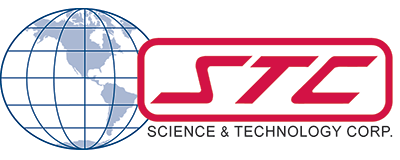Science and Technology Corporation (STC) provides professional engineering, analysis, and research services to define and defend the uninterrupted national and international access to the Radio Frequency (RF) spectrum needed now and in the future. STC engineers perform detailed engineering analysis to lead to minimal interruptions in satellite command, control, & communications (C3I) data flow.
Our RF and Antenna work:
- STC engineers provide recurring analysis and research efforts to substantiate Client’s need to retain the economically valuable spectrum it currently uses or, if necessary, to ensure access to all of the spectrum it requires.
- STC supports the phase A development of NOAA/NESDIS Radio Frequency Interference Monitoring System (RFIMS). RFIMS is responsible for monitoring the spectrum environment, especially AWS-3 LTE interference, at the17 NOAA earth stations. The system will monitor beyond the 1695-1710 MHz frequency band to the 1675-1710 MHz range, in order to be able to discern whether any adjacent RFI is impacting the POES/MetOp downlink frequencies in the 1695-1710 MHz range and the GOES downlinks in the 1675-1695 MHz range.
- As part of our NESDIS Systems Engineering Services (SES) contract, STS provides support in the development, modernization and enhancement of new and existing satellite program RF systems. Our engineers evaluate current and emerging RF systems and technologies for use with current and future satellite missions, including NOAA partner and cooperative missions. STC also supports antenna system characterization, link analyses, interference analyses and anomaly resolution studies. We provide RF system engineering and project management support in the preparation of ROM costing, performance of technical market research and antenna and ground System technical feasibility studies and analyses. Our RF work supports missions including the GOES, DSCOVR, SOHO, EWS, Sentinel, and SWFO satellites.
STC provides professional engineering, analyses, and research services in the following areas, but is not limited to:
- Performing research, testing, measurement, and analysis to address issues concerning the operation of satellites and earth stations.
- Providing spectrum management support for domestic and international coordination and certification of spectrum availability for launch and operation of Clients’ next generation orbiting missions.
- Researching issues that prevent or degrade RF communications to and from needed space-based
- Performing RF surveys, analyses, and research on electromagnetic environmental effects and frequency management.
- Procuring, installing, and testing hardware and software systems resulting from requirements identified during system planning activities.
- Identifying and assessing impacts to existing Client’s satellite ground systems due to planned commercial wireless services into frequency bands allocated for space-to-earth communications.
- Using predictive models, research, analysis, and testing to ensure the compatibility and interoperability of satellites now planned or in development with existing client ground systems.
STC Engineers provide direct support and subject matter expertise (SME) for:
- Satellite Network and Radio Frequency Coordination
- NTIA Subcommittees (Spectrum Planning Subcommittee (SPS), Space Systems Subcommittee (SSS), Frequency Assignment Subcommittee (FAS))
- International Telecommunication Union (ITU) – World Radiocommunication Process
- RF Spectrum Management
- RF Spectrum Sharing Studies
- Ground Station Analyses
- Acquisition and Acceptance Testing of Developmental Systems
- Scientific and Technical Data Collection and Dissemination
- Electromagnetic Compatibility (EMC) and Radiation Hazards (RADHAZ) Assessments

